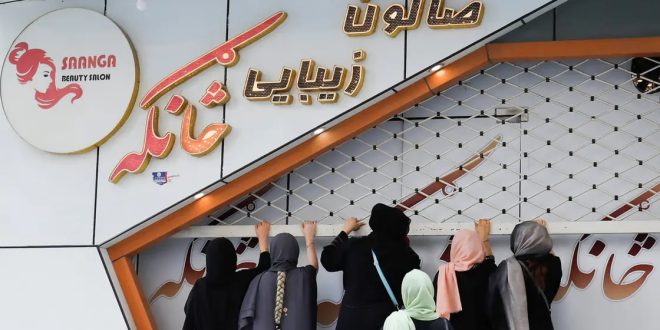AT News
KABUL – Thousands of beauty parlours across Afghanistan are shutting down permanently to abide by a new order of Taliban authorities that outlaws salons – a major blowback to one of the few revenue streams available to women in the war-battered country.
A bleak future looms for women in Afghanistan as the new restriction severely impacts tens of thousands of working women. The latest order, issued last month, mandates the closure of thousands of women-run salons across the nation. These salons often served as the primary source of income for many households and offered a rare opportunity for women to socialize outside their homes.
The order, allegedly based on instructions from Taliban’s supreme leader Hibatullah Akhundzada, will have severe consequences for women’s livelihoods. Many women in Afghanistan lost their jobs when the Taliban took control, and the beauty parlour ban will lead to around 60,000 more women losing their income from approximately 12,000 salons, according to the Afghanistan Women Chamber of Commerce and Industry.
Taliban government has implemented stringent restrictions on women’s rights, including barring them from attending high schools and universities, prohibiting their participation in public spaces like parks, funfairs, and gyms, and enforcing mandatory veiling in public.
Last week, dozens of women staged a protest against the salon closure order, only to be dispersed by security officials using gunfire and firehoses in Kabul.
Taliban’s Ministry for Promotion of Virtue and Prevention of Vice, in late June, gave salons a grace period until Tuesday to close down, stating that excessive spending on makeovers caused financial hardship for poorer families. Additionally, the ministry deemed some salon treatments as un-Islamic, claiming that certain practices like excessive makeup hindered proper ablutions for prayer, while others like eyelash extensions and hair weaving were forbidden.
International concerns over women’s rights in Afghanistan have escalated, with a report by Richard Bennett, the special rapporteur for Afghanistan, presented to the UN’s Human Rights Council last month. The report described the plight of women and girls in the country as among the worst in the world, citing “grave, systematic, and institutionalized discrimination against women and girls” under Taliban rule, which raises concerns about the possibility of gender apartheid.
As Afghanistan faces these challenges, the fate of women remains uncertain, with their economic prospects and social freedoms hanging in the balance under the Taliban’s restrictive regime.
 Afghanistan Times
Afghanistan Times




